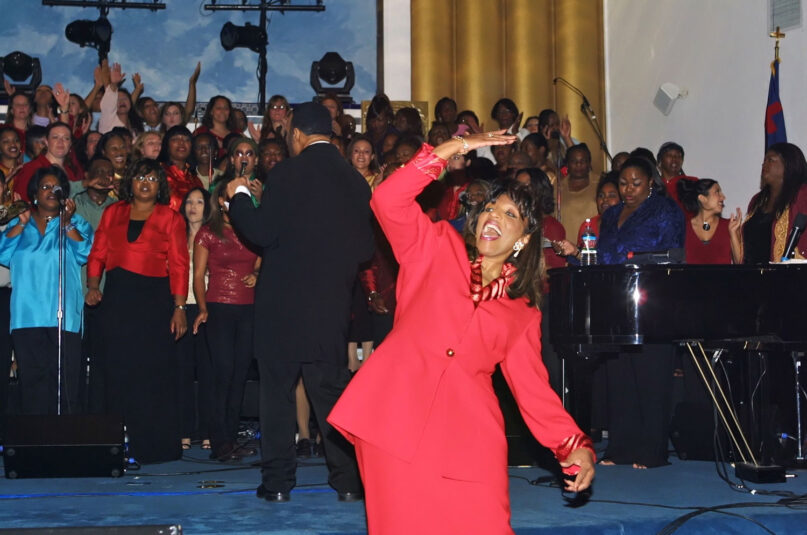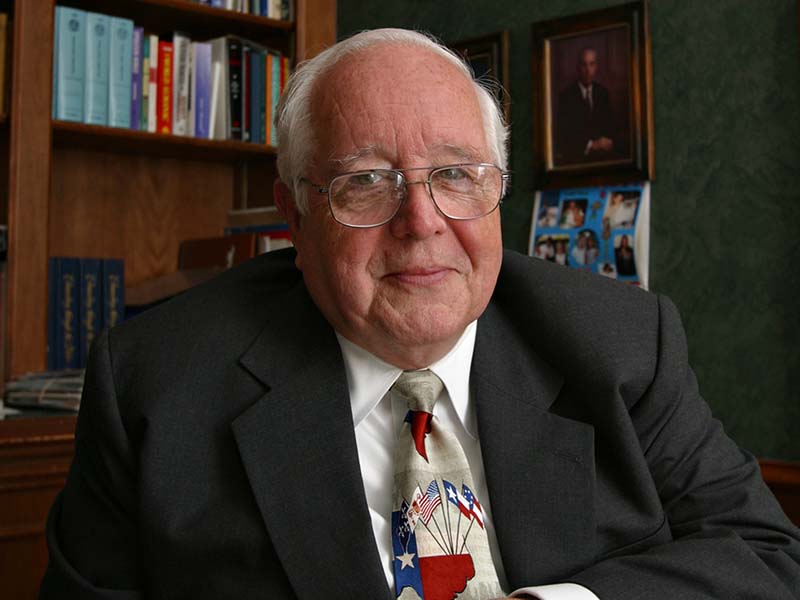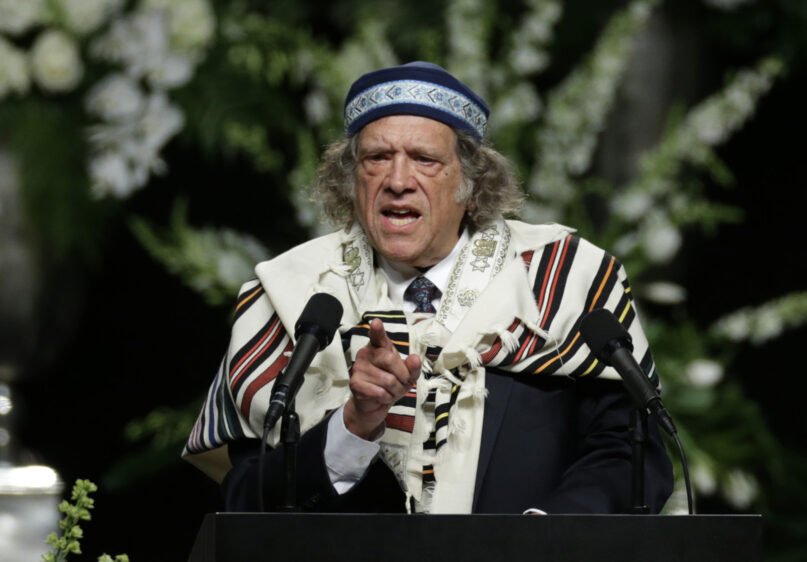
(RNS) — Religious leaders known for speaking, writing and, sometimes, scandals were among those whose deaths were noted in 2024.
Across faiths and across the globe, prominent individuals whose legacies are likely to continue to shape their ministries and missions were remembered by people within and beyond the world of religion.
They included progressives shaped by the University of California, Berkeley and educators who influenced other institutions with their perspectives on scriptural teachings. Some overcame challenges ranging from critics of their theological interpretations to segregationists who shunned them in the U.S. South. And others, once known for transforming their religious institutions, faced allegations that revised their legacies or found that their leadership responsibilities involved addressing wrongdoing in their organizations.
Here are some religious figures who died this year:
Rabbi Ellen Bernstein
Bernstein was the founder of the first national Jewish environmental organization, Shomrei Adamah: Keepers of the Earth.
She died on Feb. 27 at the age of 70.

Rabbi Ellen Bernstein in 2023. (Photo by Steven Tenenbaum)
Described by The New York Times as “a river guide turned rabbi who blazed a spiritual trail in the environmental movement by undergirding it with the Hebrew Bible’s veneration of nature,” Bernstein’s other inspirations included a high school ecology course and a cutting-edge environmental science program at the University of California, Berkeley.
In 2020, to mark the 50th anniversary of Earth Day, a Jewish publisher issued an ecologically focused new Passover Haggadah created by Bernstein to guide Jews at the Passover Seder. It sold out rapidly, prompting a second printing, and inspired many to plan “Earth Seders” — outdoors or featuring organic food grown locally.
“I have long thought that the climate crisis was a spiritual crisis, a crisis in how we think about the world and what we value,” Bernstein wrote in a 2023 RNS commentary.
“When we dig more deeply into our religious roots, we find ancient wisdom that can draw us closer to God’s green Earth, cultivate in us a generosity toward all beings and steer us on paths of justice and righteousness that will ensure a healthy future for the Earth and all of us.”
RELATED: Faith leaders, influencers who died in 2023: Preachers, protesters, writers, singers
Sandra Crouch
Crouch was the twin sister and collaborator of gospel music legend Andraé Crouch, performing with him in gatherings ranging from the crusades of Billy Graham to a meeting of the National Association of Evangelicals.
She died March 17 at the age of 81.

Sandra Crouch sings at New Christ Memorial Church, San Fernando, California, circa 2005. (Courtesy photo by Robert Shanklin for Capital Entertainment)
She and her brother co-wrote “Jesus Is the Answer” — a 1970s hit on both Black gospel and white gospel radio stations. In the 1980s, she composed, produced and sang the lead on “We Sing Praises,” for which she garnered a Grammy in 1984 for best soul gospel performance by a female, helping keep Light Records out of bankruptcy.
At the time of her death, Crouch was senior pastor of New Christ Memorial Church in San Fernando, California, after her twin brother took the controversial step in 1998 of ordaining her as co-pastor of the Pentecostal church their parents started decades earlier.
The ordination went against the ban of the Church of God in Christ, with which the congregation in the Los Angeles suburbs was affiliated. After her ordination, the Crouch siblings renamed the church, originally known as Christ Memorial Church of God in Christ.
“I believe that when you have a sense within yourself that God is calling you to work in a particular part of the ministry, that no matter what gender you are, you should be able to answer that call,” Sandra Crouch said in an RNS interview shortly after her ordination. “You don’t get a driver’s license to learn how to drive. You get a license because you know how to drive.”
Paul Pressler
The retired judge was one of the key architects of the Southern Baptist Convention’s “conservative resurgence,” when conservative leaders took control of the denomination from moderates and reshaped it into a distinctly conservative theological organization with ties to the Republican Party.
He died June 7 at age 94.

Former Judge Paul Pressler poses for a photo in his home in Houston on May 30, 2004. (AP Photo /Michael Stravato)
Pressler, who was a member of the Council for National Policy, a conservative think tank through which he connected the SBC to the GOP, became known in recent years as a symbol of the sexual abuse crisis in the denomination. He was sued by former assistant Gareld Duane Rollins Jr., who claimed Pressler abused him for decades. A settlement was reached seven months before Pressler’s death, with all those accused denying any wrongdoing.
In January, Gene Besen, a lawyer for the SBC who told RNS he was speaking in his personal capacity, called Pressler “a monster,” said the former judicial official used his “power and false piety” to sexually abuse young men and added: “The man’s actions are of the devil.”
At an earlier stage in his life, Pressler condemned what he viewed as a decline in Christian values in the nation at the time of the Clinton-era White House scandals.
“Our nation sins when adultery and fornication are no longer a bar for holding high political office and principles of biblical morality and purity are no longer promoted,” he said, according to a clip of his speech at the SBC’s 1996 annual meeting posted on X, the site formerly known as Twitter. “We sin when perversion is promoted and not penalized.”
The Rev. James Lawson Jr.
Lawson was a United Methodist minister and civil rights veteran who taught college students the practices of nonviolence so they could withstand harsh treatment as they defied 1960s Jim Crow laws.
He died June 9 at age 95.

FILE – The Rev. James Lawson Jr. speaks in Murfreesboro, Tenn., Sept. 17, 2015. (AP Photo/Mark Humphrey, File)
Then-U.S. Rep. John Lewis described in 2018 how Lawson had once given other students and him instructions on how to endure being spat upon and having lit cigarettes put in their hair and down their backs as they protested at segregated lunch counters in Nashville, Tennessee: “If it hadn’t been for Jim Lawson, I don’t know what would have happened to our country; I don’t know what would have happened to me.”
Lawson, who studied Gandhi’s principles of nonviolence as a missionary in India, became a mentor of the Student Nonviolent Coordinating Committee, an adviser to the Rev. Martin Luther King Jr. and the Southern Christian Leadership Conference, and the Southern field secretary of the pacifist group Fellowship of Reconciliation.
Speaking on Capitol Hill in 2018, when Rep. Ro Khanna, D-Calif., first introduced legislation for Lawson to receive a Congressional Gold Medal (Khanna most recently proposed a similar bill in June), Lawson remarked that the U.S. had become more violent than he ever imagined possible.
“While the gun discussion may be an important discussion, it doesn’t get into the virus that needs to be attacked: the spirit of violence, the language of violence, the thinking of violence, the despising of one another,” he said. “Nonviolence is the force that can save our nation from itself.”
Rabbi Michael Lerner
Lerner, founder and editor of the progressive Jewish magazine Tikkun, was known for his criticism of Israel’s policies about Palestinians.
He died Aug. 28 at the age of 81.

Rabbi Michael Lerner speaks during Muhammad Ali’s memorial service, June 10, 2016, in Louisville, Ky. (AP Photo/David Goldman)
In his magazine, whose name in Hebrew means “to mend, transform and repair the world” and which ended its run in April, Lerner’s stance on Israel hardened over time. In 2023 he wrote of Israel’s “pervasive racism toward Arabs.”
Lerner also was an advocate for “the desire of meaningful connection” and what he considered America’s “ethical and spiritual crisis,” ideas detailed in his 1996 book, “The Politics of Meaning: Restoring Hope and Possibility in an Age of Cynicism,” reported The New York Times.
He began his political activism while a student at the University of California, Berkeley in the 1960s. In the 1970s, he founded the Institute for Labor and Mental Health after completing a Ph.D., his second, in clinical and social psychology.
In the 1990s, he founded the Network of Spiritual Progressives, which offered trainings and spiritual gatherings through Lerner’s congregation, Beyt Tikkun: A Synagogue Without Walls, in Berkeley.
Bishop E. Anne Henning Byfield
Byfield was a former president of the African Methodist Episcopal Church’s Council of Bishops and a recent social action chair for the denomination.
She died Oct. 3 at age 74.

Bishop E. Anne Henning Byfield, president of the Council of Bishops, speaks during the African Methodist Episcopal Church conference, July 6, 2021, in Orlando, Florida. (AP Photo/John Raoux)
She helped lead the AME’s response to a massive embezzlement case in which the Rev. Jerome V. Harris, who had been executive director of the Department of Retirement Services for 21 years, was accused of stealing from the denomination’s retirement fund. Harris also died this year, in May of a heart attack.
In 2022, when Byfield was president of the Council of Bishops, the church sued Harris and others, accusing them of embezzlement and fraud. “With the help of our legal team, the AMEC community is committed to holding those responsible accountable and recovering embezzled funds,” Byfield said at the time.
At the denomination’s quadrennial General Conference held in August in Columbus, Ohio, the AME Church announced a settlement agreement in a class-action suit filed by AME clergy. If approved by a judge, the settlement would provide $20 million, though the litigation alleged a total loss of $90 million.
Byfield was the chancellor of Wilberforce University and a board member of Payne Theological Seminary, both AME-affiliated schools in Ohio. She also was known for mentoring within and beyond the AME Church as well as for her creativity, having written prayers and poems and the litany used at the 2005 funeral of civil rights activist Rosa Parks in Detroit.
Just before Byfield preached what would be her last sermon at her denomination’s quadrennial General Conference, the choir sang an anthem written by her.
Fethullah Gülen
Gülen, a Muslim cleric and Turkish scholar, built a global movement focused on service, education and the values of the Sufi Muslim faith.
He died on Oct. 20 at the age of 83.

Turkish Islamic cleric Fethullah Gulen at his residence in Saylorsburg, Pa., on Sept. 24, 2013. (AP Photo/Selahattin Sevi)
Gülen faced accusations he masterminded a failed 2016 coup in his native Turkey and spent the last decades of his life in self-exile in the Pennsylvania mountains, The Associated Press reported. His onetime ally, Turkish leader Recep Tayyip Erdogan, considered Gulen a terrorist after military factions used warplanes, tanks and helicopters in an attempt to overthrow his government that led to the deaths of some 250 Turkish civilians.
Gülen denied involvement and was never charged with a crime in the United States.
Followers of his Hizmet movement considered him to be a peaceful leader of secular education and interfaith dialogue, while Turkish leaders sought his extradition to his native country.
The movement is estimated to have millions of followers who have built a loosely affiliated global network with schools, businesses and charitable foundations in more than 100 countries.
Gustavo Gutiérrez
Gutiérrez, a Peruvian Catholic philosopher known as the father of liberation theology, died Oct. 22 at the age of 96.

Peruvian theologian Gustavo Gutiérrez attends a news conference at the Vatican, May 12, 2015. (AP Photo/Alessandra Tarantino)
Gutiérrez drew from his experiences advising Latin American bishops in Medellín, Colombia, when he wrote “A Theology of Liberation,” his signature book. It explained the theology that began to take over Latin America in the 1960s and focused on social justice for the poor and the “liberation of the oppressed.”
With liberation theology regarded with suspicion during Cold War years for its perceived communist influences, critics described Gutiérrez as a Marxist and he lived under Vatican scrutiny for most of his career, although he and his work were partly rehabilitated under Pope Francis.
In 2013, Francis celebrated Mass with Gutiérrez at the papal residence in the Vatican, along with conservative Cardinal Gerhard Müller, an invitation that demonstrated a shift in the Vatican’s attitude toward liberation theology.
In a letter that marked the theologian’s 90th birthday, Francis thanked Gutiérrez for “challenging the conscience of each person, so that no one can be indifferent faced with the drama of poverty and exclusion.”
R. Sharath Jois
Jois, a key figure in the Ashtanga yoga community known for his gentle yet firm leadership, died Nov. 11 at the age of 53.

R. Sharath Jois was a primary figure in the Ashtanga yoga community. (Video screen grab)
He was the heir of Ashtanga yoga — strenuous and rigid exercise featuring backbends, headstands and something called “the pretzel” — that was developed in the late 1940s by Pattabhi Jois, his grandfather.
Sharath Jois held workshops on Ashtanga yoga, tied to Hindu and Sanskrit rituals, in his native India and across the globe. The ones in the southern India city of Mysore, considered the home of Ashtanga, were so popular that devotees filled openings for them within moments, The New York Times reported.
Indian Prime Minister Narendra Modi recognized Jois’ influence in a statement reacting to his sudden death.
“An eminent Yoga Guru, Shri Sharath Jois Ji popularised this science of wellness nationally and globally,” Modi said. “His contribution towards encouraging people, particularly youngsters, to adopt Yoga as an integral part of their daily life will be fondly remembered.”
Tony Campolo
Campolo, an American Baptist minister and sociologist who sought to have evangelicals and other Christians address racism, poverty and other social ills, died Nov. 19 at the age of 89.

Tony Campolo, a Christian minister and author, died Nov. 19, 2024, at age 89. (Photo by Bradley Siefert/Flickr/BY-NC-SA 3.0)
The author of 35 books, including “It’s Friday but Sunday’s Comin’,” he was known for inspiring young people to listen to and act on the Christian gospel and for challenging the religious right in his social commentary.
The pastor and professor, who served Baptist churches and taught sociology at the University of Pennsylvania and Eastern College (now University), was once a spiritual adviser to then-President Bill Clinton in the 1990s. Campolo also was the founder of the Evangelical Association for the Promotion of Education, which worked in Haiti and several other countries from the 1970s to 2014.
He also founded, with activist and author Shane Claiborne, the organization Red Letter Christians, which highlighted the ethical and social teachings of Jesus — whose words appear in red in some Bibles — and sought to de-emphasize the term “evangelical” as a reference to a conservative voting bloc and elevate its definition as “a people who bring good news to the world.”
“Tony’s eloquent and charismatic nature, his great humor and amazing storytelling made him a powerfully impactful preacher, along with his gifts as a teacher, and it wasn’t long before he was on the road doing many hundreds of events every year in the United States and around the world,” wrote the Rev. Jim Wallis, director of Georgetown University’s Center on Faith and Justice, in an RNS commentary shortly after the death of his longtime friend. “He became an evangelist to evangelicals.”
Cardinal Miguel Ayuso Guixot
Ayuso Guixot, an expert in interreligious dialogue, was a leading Vatican expert on Islam known for rethreading ties between the Catholic Church and Sunni Islam.
He died on Nov. 25 at the age of 72.

Cardinal Miguel Ayuso Guixot poses for photographers prior to meeting relatives and friends after he was elevated to cardinal by Pope Francis, at the Vatican, Saturday, Oct. 5, 2019. (AP Photo/Andrew Medichini)
Ayuso Guixot was appointed by Pope Francis as the leader of the Vatican’s Dicastery for Interreligious Dialogue in 2019, after the cardinal restored the Catholic Church’s relations with Ahmed el-Tayeb, the Grand Imam of the al-Azhar, who is considered the highest authority in Sunni Islam.
The native of Spain was a member of the Comboni Missionaries of the Heart of Jesus and was ordained a priest in 1982. He was a missionary in Egypt and Sudan and, with a degree in Arabic and Islamic studies, became known for his expertise in connecting with Muslim leaders.
Pope Benedict XVI chose him to become a consultant and, later, secretary of the then-Vatican Council for Interreligious Dialogue.
Named a cardinal in 2019, Ayuso Guixot could often be seen accompanying Francis during global papal trips.
Hal Lindsey
Lindsey, author of the apocalyptic “The Late Great Planet Earth,” was long a believer that the world would soon come to an end after a period of cataclysmic events.
He died Nov. 25 at age 95.

Hal Lindsey speaks in a video. (Video screen grab)
His 1970 book, published with co-author Carole C. Carlson, connected current events with biblical prophecy and sold millions of copies.
Lindsey expected the Rapture — when some Christians, evangelicals in particular, believe they will be suddenly transported to heaven before other end-of-the-world events — would occur by 1998.
The bestselling nonfiction book became a commercial success — often available at airports, newsstands and grocery stores and adapted into a 1970s movie narrated by actor Orson Welles.
“Hal Lindsey was never an institution builder and he never collaborated with other Christian leaders,” wrote scholar Matthew Avery Sutton in an RNS commentary after Lindsey’s death.
“But he inspired a generation of evangelicals to act on the conviction that the end was near, and he fostered in them a sense of urgency and certainty and a vision of the world defined in absolute terms. While other Christians emphasized patience, humility and willingness to compromise, Lindsey taught that true believers were engaged in a zero-sum game of good-versus-evil.”
RELATED: Remembering faith leaders who died in 2022: preachers, writers and interpreters of faith
